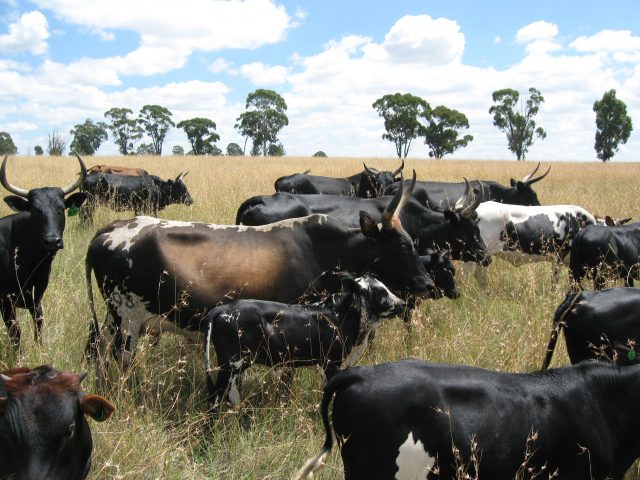Type the name of the breed you're looking for below
[wpdreams_ajaxsearchlite] Don't see the breed your're looking for? Click here and let us know!
Nguni cattle
| Place of Origin | Africa |
| Origin | The ancestors of Nguni cattle were brought by the Xhosa, Zulu and Swazi people, during their migration to Southern Africa between 600 and 1400 AD. Since then, these animals have played an important social and economic role in the development of these societies and are used as a bride's dowry. The number of animals held by a village or individual determined much of their importance to the rest of the world. King Shaka of the Zulus understood this cultural and economic importance and seized control of the Nguni herds on his dominions. Shaka also bred the Ngunis according to colour patterns in order to produce skins for the several regiments of his army, henceforward recognized by them. His elite personal guard was recognised by pure white, from animals of the royal herd, the inyonikayiphumuli. |
| Purpose | Nguni was originally, and indeed still is, a draft animal. Under sound management conditions it is becoming increasingly popular as a beef and dairy breed. |
| Appearance | The colour of these breeds of cattle have many different patterns such as white, brown, golden yellow, black, dappled, or spotty. The bulls have well developed, rounded cervio-thoracic humps which are muscular rather than fatty. The cows have small almost non existent humps. The cattle are heat and light tolerant and have thick pigmented skins covered with fine short hair of different mixtures of colour (Black, white, red, brown, cream and dun). |
| Horns | These animals present a variety of horn shapes. |
| Cows Average Weight | 300 - 400 kg (661 - 882 lbs.) |
| Bulls Average Weight | 500 - 600 kg (1102 - 1323 lbs.) |
| Other Considerations | They develop excellent resistance to ticks and immunity to tick borne diseases. Disease incidence and mortality are low. They are excellent foragers and will graze and browse on steep slopes and in thick bush alike. Nguni fatten well on natural grazing as well as in the feedlot. The historical development of the Nguni has resulted in a breed with good temperament and mothering ability. |



